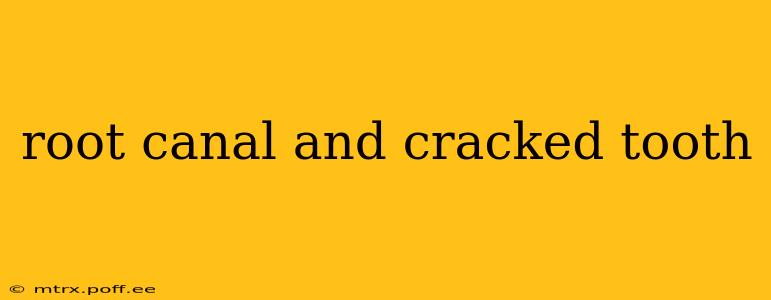A cracked tooth and the need for a root canal are often intertwined, making it crucial to understand their relationship and the available treatment options. This comprehensive guide explores the connection between these dental issues, addressing common questions and concerns. While I'm not a dentist and this information shouldn't replace professional advice, understanding the basics empowers you to make informed decisions about your oral health.
What Happens When You Have a Cracked Tooth?
A cracked tooth, also known as a fractured tooth, can range from a minor crack in the enamel to a severe fracture extending into the tooth's root. The severity dictates the treatment needed. Minor cracks might only require monitoring, while more extensive fractures often necessitate more involved procedures. The crack can be invisible to the naked eye, making regular dental check-ups essential for early detection. Symptoms can include pain when chewing, sensitivity to temperature changes (hot or cold), and persistent toothache.
Can a Cracked Tooth Cause a Root Canal?
Yes, a cracked tooth can absolutely lead to a root canal. When a crack extends into the dentin or pulp (the inner layer of the tooth containing nerves and blood vessels), bacteria can easily invade. This infection can cause inflammation and pain, necessitating a root canal to remove the infected pulp, clean the canals, and seal the tooth to prevent further infection. Delaying treatment can lead to more severe complications, such as an abscess or the need for tooth extraction.
What are the Different Types of Cracked Teeth?
Understanding the different types of cracked teeth is critical in determining the appropriate treatment. These include:
- Fractured cusp: A crack in the biting surface of the tooth.
- Cracked tooth: A crack that extends from the biting surface toward the root.
- Split tooth: A tooth that has separated into two or more distinct pieces.
- Vertical root fracture: A crack that extends from the root into the crown, often difficult to diagnose.
How is a Cracked Tooth Diagnosed?
Diagnosing a cracked tooth can be challenging because the crack may not always be visible. Your dentist will conduct a thorough examination, which may include:
- Visual inspection: Checking for any visible cracks or discoloration.
- Bite test: Applying pressure to the tooth to identify any sensitivity or pain.
- Dental X-rays: To visualize the crack and assess its extent.
- Transillumination: Shining a light through the tooth to detect hidden cracks.
What are the Treatment Options for a Cracked Tooth?
Treatment depends on the severity of the crack and its location. Options include:
- Monitoring: For minor cracks without symptoms.
- Dental bonding or filling: To repair small cracks in the enamel.
- Crown: To cover and protect a severely cracked tooth.
- Root canal: To treat an infected tooth due to a crack.
- Extraction: In cases of severe damage or infection where other treatments are not feasible.
Does a Root Canal Always Mean Tooth Extraction?
No, a root canal does not automatically mean you'll need to have your tooth extracted. A root canal aims to save the affected tooth by removing the infected pulp, cleaning the canals, and sealing the tooth to prevent further infection. However, if the crack is too extensive or the infection is too severe, extraction may be necessary.
Can I Prevent Cracked Teeth?
While you can't eliminate all risk, taking preventative measures significantly reduces the chance of cracked teeth. These include:
- Avoid biting hard objects: Such as ice, hard candy, or pens.
- Use a mouthguard: During contact sports to protect your teeth from impact.
- Maintain good oral hygiene: Regular brushing and flossing strengthen enamel and reduce the risk of cavities.
- Regular dental checkups: Early detection can prevent more serious complications.
How Much Does Root Canal Treatment Cost?
The cost of root canal therapy varies depending on several factors, including the dentist's location, the complexity of the procedure, and any additional treatments required. It's best to contact your dentist directly for an accurate cost estimate.
This information provides a general overview. For personalized advice and treatment, consult with your dentist. Early detection and appropriate treatment can help save your tooth and maintain your overall oral health. Remember that regular dental checkups are key to preventing and addressing dental problems effectively.
